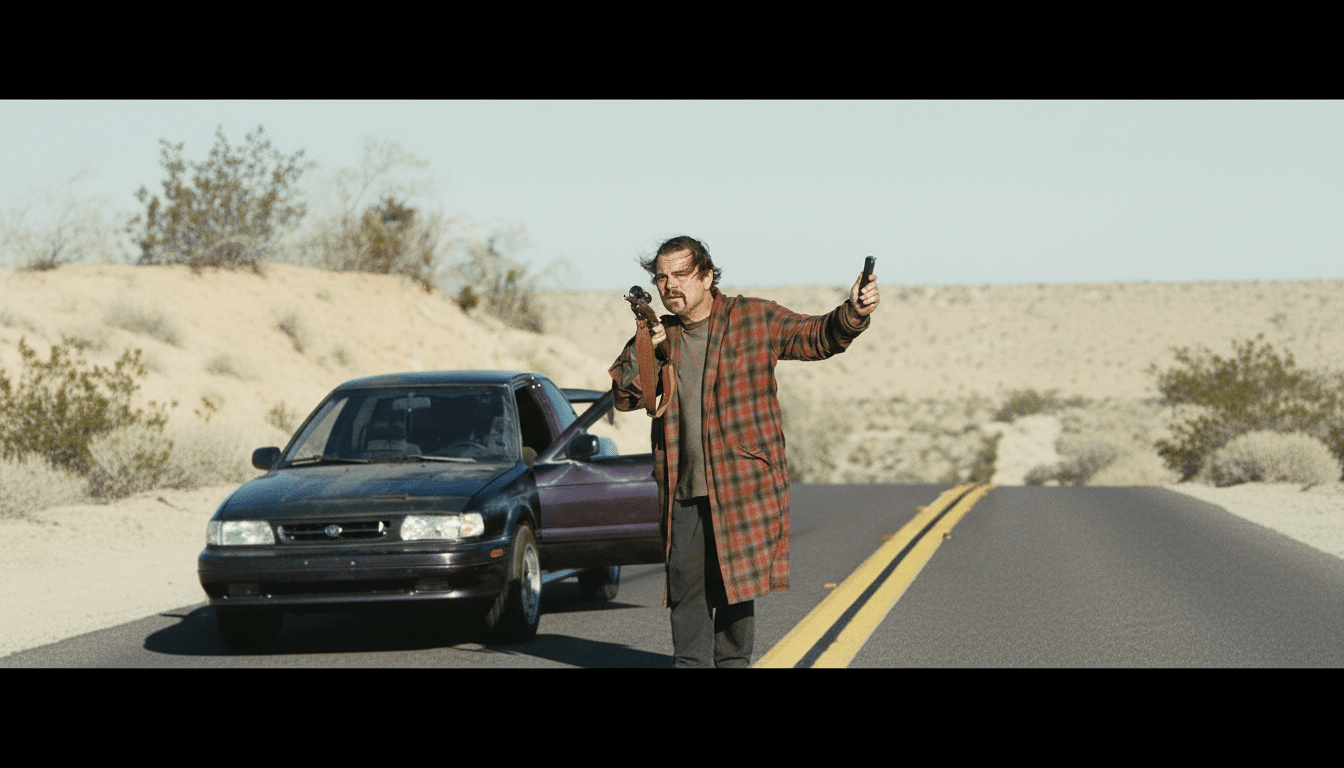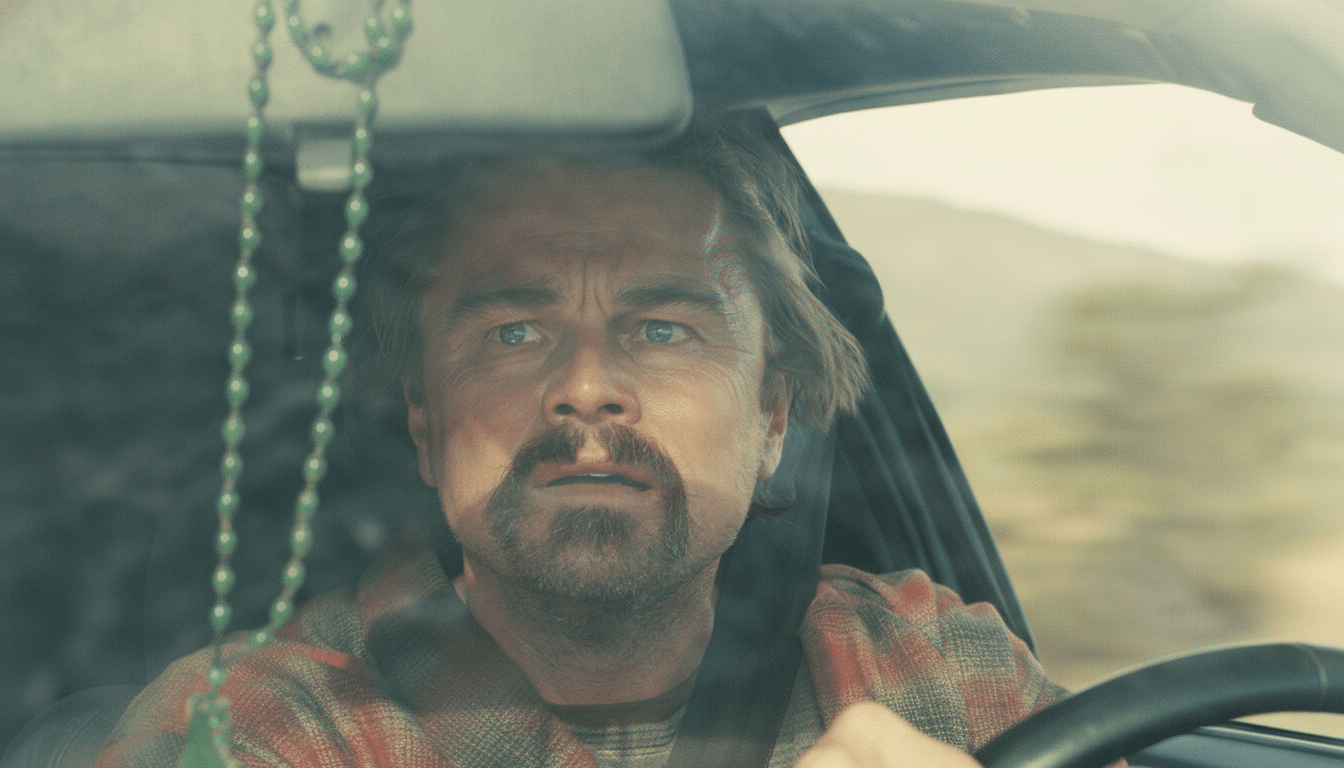Paul Thomas Anderson’s One Battle After Another is a rare bird of a movie: A political thriller that runs like a chase film, sticks its jokes with gymnastic precision, and yet bakes in room for big, thorny ideas.
Leonardo DiCaprio is the star, obviously, but the movie’s energy arises from a group effort that moves between danger and absurdity as if they were inseparable.

Anderson, an 11-time Academy Award nominee, has always done a balancing act between operatic stakes and sly humor. Here he pushes the accelerator. The result is driving, often riotous, and discomfitingly resonant.
A propulsive, politically savvy narrative
Opening with Perfidia Beverly Hills (Teyana Taylor), a charismatic revolutionary, storming the French 75 in a brazen prison break, the film sets its pace early. Her ferocious, wry, and cocksure spirit is what sets the tone — in more ways than one — for both the movie and its politics, long before DiCaprio even hits the screen.
Perfidia’s grip on bombmaker Pat “Ghetto Pat” Calhoun (DiCaprio) and the uptight, ruthless Col. Steven J. Lockjaw (Sean Penn) lays a fuse that burns through decades. A defining split leaves a daughter, Willa, raised in hiding by Pat and his fellow radical, Lady Champagne (Regina Hall), until the past kicks down their door.
Structure-wise, Anderson takes a gamble — getting rid of a force of nature early — and it pays off big-time. The movie shifts from insurgent caper to father-daughter survival odyssey without ever losing momentum. It’s nearly episodic in length but proceeds with the breathless speed of a 90-minute nail-biter.
DiCaprio is the star, but women set the stakes
DiCaprio delivers a sometimes slapstick physical performance that weaponizes klutziness — see his screwball elasticity in The Wolf of Wall Street — but locates it within a context of fatherly panic. Pat’s cannabis-loosened reflexes meet the life-or-death urgency, and DiCaprio digs into that friction for laughs and ache.
It’s still the film’s Black women that provide its spine. Taylor’s Perfidia is a force of nature, and her ideology and charisma haunt every decision. Chase Infiniti’s Willa combines that inheritance-borne battering and puts it into drive toward atonement (fighter pilots have nothing on her), charting a coming-of-age that exchanges prom-night jitters for battlefield instinct. Lady Champagne radiates warmth and steel: a revolutionary whose softness is never an obstacle to her tactical clarity.
Penn goes the grotesque satire route as Lockjaw, a walking affectless suit of armor whose brittle masculinity curdles into menace and vaudeville. Benicio del Toro, as Willa’s martial-arts instructor, Sergio St. Carlos, alternates cool detachment with DiCaprio’s agitated slapstick. Together they’re an odd-couple comedy engine that’s funny without puncturing the film’s stakes.

Action craft delivers sharp set pieces with comic bite
Set pieces swing between bruising and absurd, reflecting how American media grooms images of violence. A school-dance siege in the middle of the film flips from teen euphoria to mayhem on a dime, while a climactic car pursuit is so masterfully modulated in point of view that it might as well have been designed by Nerf. “Sitting Duck” — it’s an apt name.
Shot on large-format film and presented in premium formats, the images have a tactile heft — the grain and saturation that make metal throb and skin glow. The soundscape is similarly sinewy: gunshots slap, engines growl, and the needle drops land like punches. IMAX has said that it’s seen increasing appetites for premium large-format experiences from audiences in recent years; this is constructed to make the upgrade worthwhile.
Satire wired to the moment, biting and uncomfortably real
The movie also tips its hat to Thomas Pynchon’s Vineland in its jabs at surveillance, media manipulation, and the rubber-band mythology of American power. Anderson sends up a white-nationalist boys’ club in the kind of ridicule that calls back to radio serials like The Adventures of Superman’s “The Clan of the Fiery Cross” and the Coens’ appetite for buffoonery-as-exposure.
Crucially, the satire doesn’t hover airlessly above reality. There have been more than 11,600 hate-crime incidents reported to the FBI in its latest comprehensive report, the highest number since national tracking began — context that lends its excesses an uncomfortable plausibility. The jokes hit; the aftertaste is bitter.
Anderson also examines allyship and the kind of paternal blind spots that great dads never know they have. Pat’s love is true, his instincts are awful, and Willa can no longer wait for his patchy growth curve to intersect with her own. The film recognizes that for some, the personal is the political whether invited to be or not — and it takes that as urgency rather than a preachable sermon.
Final verdict: a fierce, funny, politically charged thrill ride
One Battle After Another is a combustible mixture of chase-movie kinetics, political farce, and generational handoff. DiCaprio is great, but the movie belongs to Teyana Taylor’s gravitational first-act blaze and Chase Infiniti’s breakout resilience.
It’s also Anderson at his most audience-forward: large laughs, bigger thrills, and ideas that keep buzzing after the credits.
Deliciously brutal, raucously funny, and a hell of a good time, it’s that rarity in the political-thriller genre — an entertainment that never blinks, no matter what it might be costing itself in terms of angering its own constituency.

